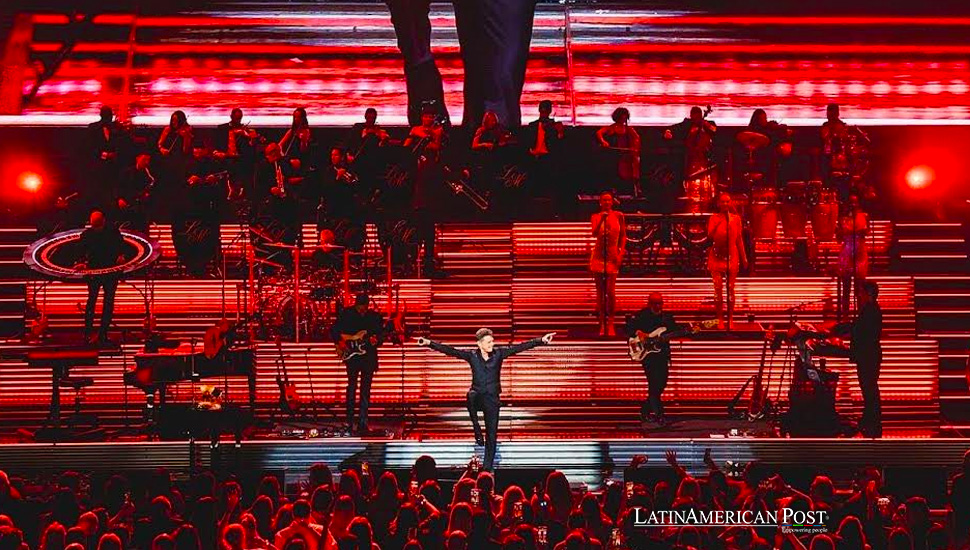Luis Miguel’s Quito Concert Hangs in Balance Amid Ecuador’s Security Crisis

The highly anticipated concert of Mexican singer Luis Miguel in Quito, scheduled for February 21, is still being determined as authorities deliberate on allowing mass events declared under the state of emergency to combat organized crime.
Ecuador’s Uncertain Musical Horizon: Luis Miguel’s Concert in Jeopardy
Ecuador’s vibrant music scene faces an unprecedented challenge as the country grapples with heightened security measures against organized crime. The spotlight falls on the upcoming concert of the beloved Mexican singer Luis Miguel, dubbed the “Sun of Mexico,” whose single performance in Ecuador as part of his 2024 Tour is now uncertain. Scheduled for Wednesday, February 21, at the Olympic Stadium Atahualpa in Quito, the event’s fate hangs in the balance, awaiting a decisive verdict from the national authorities.
The state of exception, since early January, represents the government’s rigorous stance to curb the rising tide of organized crime that has swept across the nation. This includes a nocturnal curfew with varying hours across provinces and cities, determined by the level of risk assigned by authorities. Amid these stringent measures, the entertainment industry finds itself at a crossroads, negotiating the space between public safety and the eagerness to return to normalcy with live events.
FTC Live, the production company behind Luis Miguel’s Ecuadorian spectacle, along with a scheduled performance by Dutch electronic music producer and remixer Martin Garrix on Saturday, February 24, has emphasized the importance of audience safety and wellbeing. “The security and wellbeing of our audience is our top priority,” stated a press release from FTC Live, highlighting the ongoing dialogue with officials to ensure the concert can proceed without compromising public safety.
COE’s Decision Looms Over Entertainment Sector
The decision rests with the National Committee for Emergency Operations (COE), which has initially signaled a restriction on public access to sporting events, including first-division football matches, as part of the broader effort to prevent large gatherings that could exacerbate the security situation. This stance casts a shadow over the entertainment sector, eagerly awaiting a green light to host events that have long been a source of joy and cultural expression for Ecuadorians.
The backdrop to this uncertainty is a country in turmoil, facing an escalating conflict against criminal bands now designated as terrorist groups and non-state belligerent actors by the government of President Daniel Noboa. This declaration follows a surge in violence, including kidnappings of police officers, murders, explosive threats, vehicle arson, prison riots with about 200 hostages (eventually freed), and even the audacious takeover of a television channel by an armed group later apprehended.
Government’s Strategy and Its Implications
These developments have thrust Ecuador into a declared “internal armed conflict,” marking a stark shift in the nation’s approach to combating organized crime. The government’s strategy, characterized by military and police mobilization to neutralize these threats, reflects the severity of the crisis but also raises questions about the impact on civil liberties and daily life, including the cultural sector’s ability to host events and concerts.
As the music industry and fans await the COE’s decision, the situation underscores the broader challenge of maintaining cultural vibrancy and public engagement amid security concerns. The potential cancellation or postponement of Luis Miguel’s concert affects fans and promoters and signals the broader implications of the security crisis on Ecuador’s cultural and economic landscape.
Balancing Act: Navigating Security Measures and Cultural Activities
The uncertainty surrounding the concert is a microcosm of the tension between ensuring public safety and sustaining the arts and entertainment that enrich society. It poses a critical test for Ecuador’s ability to navigate the fine line between security measures and the preservation of cultural activities. For fans of Luis Miguel and the broader music community in Ecuador, the hope remains that a solution can be found that allows for the safe conduct of the concert, offering a much-needed respite and a moment of unity in challenging times.
Also read: Venezuela’s Ángelo Colina Champions Spanish Comedy in the United States
As the days narrow down to the scheduled concert date, the COE’s decision will determine the fate of Luis Miguel’s performance and set a precedent for future events in the current security climate. It’s a moment of reckoning for Ecuador, as it balances the imperative of safety with the equally vital need for cultural expression and connection, underscoring the resilience of art and community in the face of adversity.




